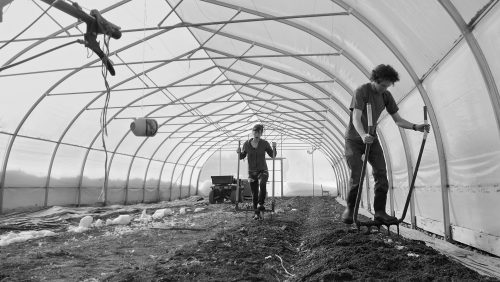Filmmaker Moïse Marcoux-Chabot, has lovingly crafted a six-part documentary series that captures the essence of the neo-rural movement in Quebec’s Gaspé Peninsula.
Literally the movement of people from cities back to the land, this resurgence is creating a healthier way of life that fosters food self-sufficiency using hand tools, heritage seeds and good old-fashioned knowledge. This simple agrarian life is effectively tackling critical issues like climate change while fostering environmental protection and making every day purposeful.
Sharing the land is not only financially advantageous, but close proximity to neighbours makes it easy to share ideas, knowledge, seeds, buying power, food talents, food literacy, celebratory meals and to build meaningful connections with everyone living within the community and the nearby villages.
This series is a valuable resource for secondary school teachers. It tackles heavy topics like addressing the climate crisis in practical and sustainable ways; artisanal employment and economic opportunities; building community and meaningful relationships; gender equity; genetic diversity; heritage or heirloom species; environmentalism; entrepreneurship; small scale diversified farming versus large scale mono-cropping; biodynamic versus organic versus industrial pesticides; baking; cider making; the importance of music, storytelling and dance; protecting the earth from drilling and fracking; and respecting and incorporating the knowledge and traditions of First Nations and Métis peoples into the settler way of life.
This series is particularly relevant for any teacher undertaking the Truth and Reconciliation Commission’s 94 calls to action. One episode focuses on settler communities banding together to protect Mother Earth from oil drilling and natural gas fracking. They consult with First Nations chiefs to understand what protecting the Earth looks like from their lived experience.
Not surprisingly, when the settlers established a permanent camp to keep an eye on any drilling or fracking activities, the police arrive to take note of the number of people in the camp. Then, two episodes later, the settler protectors are four months into their occupation complete with a yurt, working solar panels, and yet another structure to house supplies and equipment under construction. It’s clear, the settlers have no intention of leaving the camp until the oil company leaves the land.
Not once are the settler protectors told to move from the area, nor are they cut off from access to their supplies, nor are their supplies inspected for weapons; nor is the Quebec police force or the army deployed to deal with them. That makes for an interesting comparison with what took place in Kanehsatake in 1990 or currently on the traditional territory of the Wet’suwet’en in British Columbia.
A heads-up that both episodes one and four show a hog being slaughtered and dressed, although it is handled as quickly and humanly as possible. It serves as a reminder of just where our food — especially meat — comes from.
Each 30-minute black and white episode, filmed in French with English subtitles, reminds viewers, “If you dream alone, it’s a dream. If you dream with others, it becomes reality.”
Gatherings is available on NFB.ca starting March 7, 2020.
Doreen Nicoll is a freelance writer, teacher, social activist and member of several community organizations working diligently to end poverty, hunger and gendered violence.
Image: Still from episode 2 of Gatherings.



